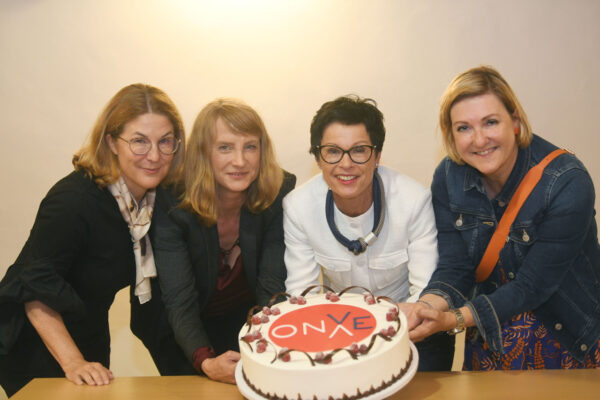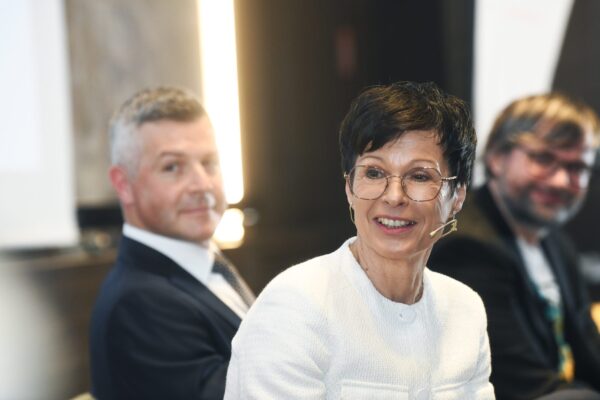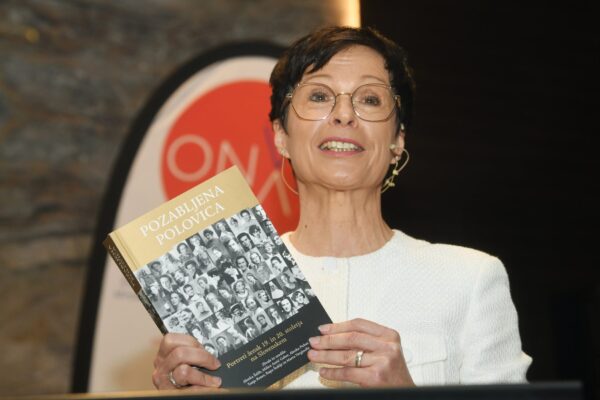Today, almost two months after The International Women’s day and on a day of an networking event organized by Ona Ve, Javni gospodarski zavod, JGZ Brdo in Kranj, dedicated to among other topics state protocol, DC Slovenia brings you part II of the interview with the amazing Marta Kos, president of the Ona Ve organization who together with her colleagues from Ona Ve, plays the pivotal role in Gender equality issues, projects, initiatives and activities in Slovenia.

Why was the organisation Ona Ve (She knows) in which you are the president, founded. How does it work today, what are the mayor successes/challenges?
When I was Ambassador to Switzerland, I was impressed by the way women organized themselves in the run-up to the federal parliamentary elections and set up the She Knows online network to raise women’s visibility. I asked the organizers of the network, Alliance F, for their know-how on how to set up a similar network in Slovenia and they enthusiastically gave me everything I needed.
Despite being a journalist by profession and having worked in journalism for quite a few years, I had never wondered about the representation of women in the media and, in particular, why there are more men than women in the media. However, I am extremely intrigued by this topic. That’s why in Slovenia we have built the network of female professionals with as of today 535 members. These contacts are available for the media so that they can never again say that there is no proper woman to invite. We started counting the proportion of women in various media programmes, and we conducted the first scientific study on gender representation in the Slovenian media. We also looked at the recipients of important state awards and honours and found that there are on average 5 times more men than women. For the period since Slovenia’s independence, we have data that only 13% of women have received the highest state honours, only 17% of women have received the highest cultural award for lifetime achievement, the Prešeren Prize, and only 20% of women have received the highest scientific award. We are also currently completing a very important project in which we are going to draw up a list of all the streets and monuments in Slovenia that are named after women.
What I am most proud of is that on 5 April we signed a 50-50 commitment on gender equality with the national broadcaster, RTV Slovenia. We plan to sign similar commitments with other media. In the second half of the year, we will also offer to all event organizers, from private companies to public and state institutions, to sign a slightly different pledge to be gender-balanced in the events they organize and to pay attention to gender-sensitive use of language.

President of Slovenia, Natasa Pirc – Musar is the founder of Ona Ve– what is her relationship with the organization today?
I always like to say that we miss her, because until she became President of Slovenia, Nataša was the technical and legal director of our association, informally of course. She comes to events as much as possible and is always open about gender equality issues, which are high on her priority list.
Why is it important for you personally to represent/give support to women? Do women really lack rights or competences? Maybe women put themselves in the centre of family life and not in career?
You have raised a very important question, namely, why the unnatural flow of events is always being restored, according to which men have an advantage: there are more of them in leading positions, they have higher salaries, they do less housework, and there are more of them in the media and at public events. I see the biggest reason why this is the case in centuries of patriarchal development, where women for a long time did not even have access to public space, were not allowed to study. In some European countries even in the 1970s they were not allowed to open a bank account or take a driving test without consent of the husband. These patriarchal patterns are so deeply embedded in society and women that some even today actually believe that they are not really professionals who would be able to perform well in the media and at public events. A special reason is also that women in public space are judged significantly more than men by our appearance, by how we dress and how we look, and less by what we say.

How did you personally find a balance between your career and private life? How are you finding it today?
I never felt this was a problem. Rather, I would say that the balance was established almost by itself, with my attitude towards what I was doing and am doing. I love life and what I do very much. And I love the people in it.
What does having children “bring” to a woman, and what do children, so to say “take away” from a woman? How often women manage to find a balance between work and family? How does the Slovenian society look at this “having or not having children issue? Is the social climate patriarchal here or?
I can’t speak about this from personal experience because I don’t have children. I am often misunderstood when I mention mothers who stay at home for the sake of their children. I welcome it when mothers decide for themselves, but it would not be right for it to happen because they had no choice. When we talk about equality, the most important thing is that women and men have the same opportunities, that women can also work in addition to having a child, that they can earn the same as men, that they are not discriminated against because they are young and will have a child. I don’t think that there is a problem about this issue in Slovenia.
And now some questions about your days as an athlete-swimmer; You were a member of the national teams -Slovenian and Yugoslav. We wonder where do you keep all those swimming medals and trophies today? Are they in Switzerland – if your home is there now?
No one has asked me that yet, nice. I have saved only a few medals and awards, because there were too many of them and it was impossible for me to take them with me when I moved a lot. In keep them at my Slovenian home not in Switzerland.
Are you still a person who prefers to be alone having in mind your amazing success in individual sport? Is that perhaps the reason why you “crave” for an organisation/a team of people on a same project?
Yes, swimming is a very individual sport when you are in the pool, but also a team sport when it comes to the team and club you belong to. Or the national team, in my case Slovenian and Yugoslav. I really like being alone, but I also like to be in the company of people. To me, being alone means being creative and contemplative, and in company I draw energy for projects that I can’t possibly accomplish alone. ONA VE is such a project that can only succeed based on solidarity and the awareness that only joint work can bear fruit.
Are you a competitive “at heart”? Were you ever?
Oh, yes, very competitive, which I see as something positive. A lot of this character trait of mine comes from my swimming days and it has helped me a lot in life. Being competitive for me means really fighting to be the best, but at the same time knowing that you can’t always win. You know how many people are training this year for the Olympic Games that will be held in Paris. But there will be only few Olympic winners. If you’re not competitive, you can’t even think about qualifying for the Olympics, let alone winning.
What is your advice on how to handle defeat?
Accept the defeat, analyze (but not too long and too deeply) why it happened. Then throw this experience over your shoulder and start biting for new success.
Is divorce a defeat? Do you perhaps feel the need to empower women on this issue? Is divorce still a taboo in Slovenia?
Only the people involved can judge this. For some, divorce is a victory, for others liberation, for others a defeat. I still feel bad for getting divorced, even though today I am doing very well with my second husband. In Slovenia, an average of 6 marriages are dissolved per day. I think that divorce in Slovenia is not a taboo and that the majority do not see the dissolution of a marriage as a shame. I don’t see a particular social problem in this, that we should organize special help for women. But if someone needs it, they can get it.
Have you tried another sport later in life that you enjoy? Which one?
Yes, mountains and hiking are my great love, I like it when by conquering a mountain you somehow conquer yourself. I like to ski in the winter, but I even prefer to go on snowshoes. You can go anywhere with snowshoes, it’s an exceptional sport. But it is not easy, especially if you must overcome hundreds of height meters.
How about your political career in future; do you have some plans to “go back”?
No, even if they say, “you never say never”, I say: never. During these days, I rejected the initiative of the president of the strongest government party in Slovenia and at the same time the prime minister to be the first on the party list for the European elections, with the possibility of becoming a commissioner in the European Commission in Brussels. I have other priorities in my life at the present.
What needs to happen in Slovenia in order for you to decide to return to politics?
Nothing. I involved myself in the parliamentary elections in 2022 and this was an experience I wouldn’t want to miss. In enjoyed it so much, especially because it meant working with some great people and being able to set the tone for the future development of Slovenia.
And to conclude, DC Slovenia is sure that politics needs persons like you, and that’s what the citizens who, after your withdrawal from the pre – race, told you by not voting for your party, the Gibanje Svoboda.
Thank you for your nice words, I’m touched. When I withdrew from the presidential campaign, I felt the worst because of the people who believed in me, who voted for the Freedom Movement mainly because of me. It wasn’t easy. But politics is about interests, and if you decide to be part of it, you are thrown into a system that does not always work according to your principles. Some tolerate it well, I don’t. Yes, I am an idealist and I still believe that the most important task of politics is to work for the good of its citizens, not for the interests of its political party or for its own personal interests.
“When I look at my career, I always think of Steve Jobs and his theory about connecting the dots, connecting what happens in your life. We can only connect these dots for the past, never for the future. So I also think that what I do today and who I am today is the result of all the different things I did in the past.” Marta Kos
Follow Ona Ve on Social media:
https://www.facebook.com/onave.si
https://www.instagram.com/onave.strokovnjakinje/
https://www.linkedin.com/company/onave/